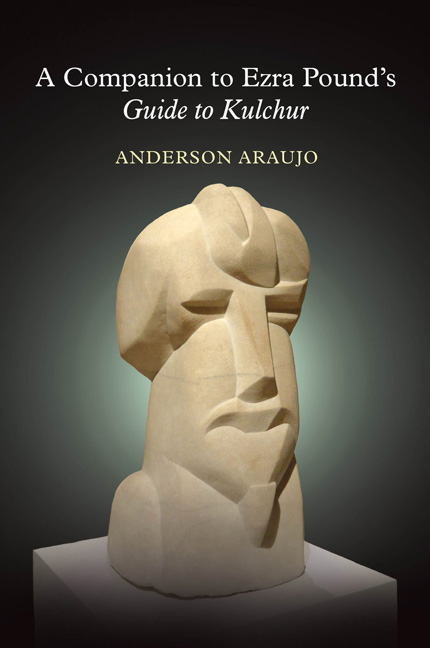Book contents
- Frontmatter
- Contents
- Acknowledgments
- Abbreviations
- Introduction
- Guide to Kulchur
- Part I
- Section I
- 1 Digest Of The Analects
- 2 The New Learning: Part One
- 3 Sparta 776 B.C.
- 4 Totalitarian
- 5 Zweck or the Aim
- Section II
- Part II
- Section III
- Section IV
- Part III
- Section V
- Section VI
- Part IV
- Section VII
- Section VIII
- Section IV
- Part V
- Section X
- Section XI
- Part VI
- Section XII
- Section XIII
- Addenda: 1952
- Notes
- Index
2 - The New Learning: Part One
from Section I
- Frontmatter
- Contents
- Acknowledgments
- Abbreviations
- Introduction
- Guide to Kulchur
- Part I
- Section I
- 1 Digest Of The Analects
- 2 The New Learning: Part One
- 3 Sparta 776 B.C.
- 4 Totalitarian
- 5 Zweck or the Aim
- Section II
- Part II
- Section III
- Section IV
- Part III
- Section V
- Section VI
- Part IV
- Section VII
- Section VIII
- Section IV
- Part V
- Section X
- Section XI
- Part VI
- Section XII
- Section XIII
- Addenda: 1952
- Notes
- Index
Summary
heteroclite: “Deviating from the ordinary rule or standard; irregular, exceptional, abnormal, anomalous, eccentric.” Pound had used the term in a similar context just a few years earlier in a Criterion essay praising Laurence Binyon's translation of Dante's Inferno (1933) into English triple rhyme: “One got interested in the wealth of heteroclite material, incident, heteroclite anecdote, museum of medieval history, etc. Whenever there was an immediate difficulty one looked at a note, instead of reading on for ten lines and waiting for Dante to tell one.”
Rabelais's time: Francois Rabelais (c.1494–1553), French Renaissance humanist, satirist, and comic writer. Author of the satires Pantagruel (1532–33) and Gargantua (1534). Pound cites Rabelais's essays elsewhere in GK as precedents for the book (GK 207). It is not hard to see why, as Rabelais's works display
an encyclopedic frame of reference, encompassing virtually all the fields of knowledge of his day—theology, law, medicine, natural science, politics, military art, navigation, botany, ancient and modern languages—and many aspects of everyday life and society. They therefore read as dazzlingly complex and wonderfully disorienting images of the Renaissance world.
From Jonathan Swift to Laurence Sterne, and James Joyce to Pound, Rabelais's influence on English literature has been extensive. In the New Republic issue of June 4, 1930, Pound published a defense of Samuel Putnam's translation of Rabelais.
Montaigne: Michel de Montaigne (1533–92), French moralist and essayist, widely acknowledged as the inventor of the modern “essay,” a reputation built on his Essais (1580–95). Like Rabelais's essays, Montaigne's are also cited as precedents for GK. Both writers, Pound notes, “are unpretentious in so far as they don't ask you to suppose that they know it all, and yet from Montaigne or Rabelais you would, I believe, acquire curiosity by contagion” (GK 207). Montaigne's essays cover topics ranging from moral, religious, and philosophical to political and historical. However, as Patrick Riley points out, “it immediately strikes the reader that if the Essays seeks totality, it is not narrative totality.
- Type
- Chapter
- Information
- A Companion to Ezra Pound's Guide to KulcherGuide to Kulcher, pp. 41 - 59Publisher: Liverpool University PressPrint publication year: 2018



